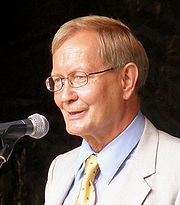Tunne Kelam
|
Tunne-Väldo Kelam MEP |
|
|---|---|
 |
|
| Member of the European Parliament | |
|
Assumed office 13 June 2004 |
|
| Constituency | Estonia |
| Personal details | |
| Born |
Tunne-Väldo Kelam 10 July 1936 Taheva, Estonia |
| Political party |
Pro Patria and Res Publica Union European People's Party |
| Spouse(s) | Mari-Ann Kelam |
| Children | 1 (from a previous marriage) |
| Alma mater | University of Tartu |
| Website | www |
Tunne-Väldo Kelam (born 10 July 1936) is an Estonian politician and Member of the European Parliament (MEP) from Estonia. He is a member of the Pro Patria and Res Publica Union, part of the European People's Party.
After graduating from Tallinn 2. Secondary School in 1954 he studied history in the University of Tartu (1954–1959). He was a senior researcher in the State Central Archives in Tartu (1959–1965) and a senior scientific editor of the Estonian Soviet Encyclopaedia in Tallinn (1965–1975). From 1959 till 1970, as a member of the "Science" society, Kelam was also part-time lecturer and columnist on international relations.
In 1972 he prepared a memorandum to the UN on behalf of two underground citizens' groups, which asked for the UN assistance to evacuate the Soviet occupation forces and organize free elections. Smuggled out of the country, the memorandum caused lively interest in the West but resulted also in the wave of KGB repressions at home. Kelam narrowly escaped arrest but lost his job in the Encyclopaedia and all his public activities were suppressed. He stayed for the next dozen years under strict KGB surveillance but continued to operate half-underground, organizing unofficial opposition groups and passing to the West information about human rights violations in the Soviet occupied Estonia. From 1979 till 1987 Kelam was employed as a night-shift worker on a state poultry farm.
By the end of the 1980s he had become one of the leading advocates for restoration of independence in Estonian society. In August 1988 Kelam became a founding member of the Estonian National Independence Party (ERSP, Eesti Rahvusliku Sõltumatuse Partei), the first non-Communist political party on the territory of the Soviet Union. In 1989 he emerged as one of the leaders of the Estonian Citizens' Committees Movement - a massive citizens' initiative in support of restoration of the independent nation state. In February 1990 Kelam was elected to the Congress of Estonia - a transition time representative body of Estonian citizens, which aspired for full-fledged independent statehood on the basis of the legal continuity of the Republic of Estonia. From 1990 to 1992 Kelam served as chairman of the Estonian Committee, an executive body of the Congress of Estonia. In August 1991 he was instrumental in achieving a national understanding with the Soviet Estonia's Supreme Council on the principles of restoring Estonian statehood.
...
Wikipedia
